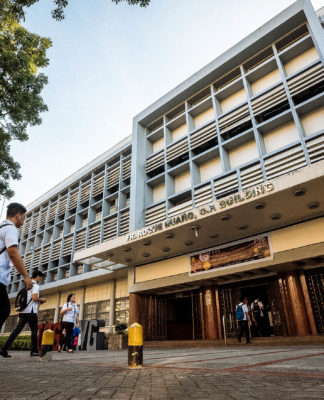 AWARD-WINNING novelist Lualhati Bautista published in 1988 her novel ‘Gapô (at isang puting Pilipino, sa mundo ng mga Amerikanong kulay brown), about the Filipino-American Michael Taylor, Jr. who lived in Olongapo City during the height of the presence of US military bases in the Philippines.
AWARD-WINNING novelist Lualhati Bautista published in 1988 her novel ‘Gapô (at isang puting Pilipino, sa mundo ng mga Amerikanong kulay brown), about the Filipino-American Michael Taylor, Jr. who lived in Olongapo City during the height of the presence of US military bases in the Philippines.
In a time when it was trite for locals to ogle at American products and for women to look for American husbands, Michael Taylor, Jr.–albeit being the white-skinned half-Filipino that he is–seemed to be the only one to scrutinize and critique the omnipresence and exploitations of Americans in the country.
Last Oct. 11, Jeffrey “Jennifer” Laude, a Filipino transgender woman, was found dead in a Subic motel room. The suspect?–US Marine private first class Joseph Scott Pemberton, a crew member of the USS Peleliu docked at Subic Bay Freeport.
Pemberton was initially detained in USS Peleliu. It was speculated that he was being given special treatment. However, after public pressure to subject him under Philippine custody, Pemberton was transferred to Camp Aguinaldo (but with only American guards outside his door and only Americans allowed inside).
Laude’s death sparked nationwide outrage over, among other things, the Visiting Forces Agreement (VFA), the 16-year-old contract between US and the Philippines allowing the entry and visit of US military personnel for joint military exercises.
As stipulated in Article 5 Section 6 of the VFA, “the custody of any United States personnel over whom the Philippines is to exercise jurisdiction shall immediately reside with United States military authorities, if they so request, from the commission of the offense until completion of all judicial proceedings.”
Which is why Pemberton is still technically under US custody, said US Ambassador to the Philippines Philip Goldberg, and that US has “exceeded its obligations” by transferring Pemberton to Camp Aguinaldo.
Despite this, Department of Foreign Affairs (DFA) spokesman Charles Jose said custody would not matter since the Philippines will have jurisdiction over the case, which he noted would have been impossible if not for the VFA.
“We should bear in mind that if there was no VFA, maybe we won’t even have jurisdiction over this case,” Jose told reporters. “They can be tried in court [and] if convicted, they will serve [their sentence] in the Philippines. That is the more important thing.”
Meanwhile, four US Marine witnesses in the Laude case have left the country without the knowledge of DFA. Jose said they are not required to attend the preliminary investigation anyway since they have provided their sworn statements. Nonetheless, the VFA states that US and Philippine authorities shall cooperate in the investigation, including “providing for the attendance of witnesses” during the trial.
We can recall the Subic rape case in 2006, wherein lance corporal Daniel Smith was convicted for the rape of Filipina Suzette Nicolas. Throughout his sentence, Smith was detained in the US Embassy despite court orders that he should be imprisoned in Philippine jail. He was brought back to his homeland in 2009 after the Court of Appeals acquitted him because Nicolas repudiated her rape story. It was as if nothing had happened.
To state the obvious: it does not follow that there will be justice even if there is jurisdiction.
The Philippine government is yet again proving that it has a loose grip of its laws and treaties as it did back in the Subic rape case. President Benigno Aquino III is staunch in maintaining the VFA despite its apparent loopholes (ironically, Aquino, when he was still a senator, supported the abrogation of the VFA unless the US agrees to renegotiate the contract). But if the VFA would not be repealed, it should be amended, or at least be upheld. Judging by the current situation, none of the prerogatives of the Philippines under the VFA is sustained. On the other hand, DFA Secretary Albert del Rosario admitted the agreement has been reviewed, but it could not be amended because US does not seem penchant to renegotiate. Since review is futile if there will be no renegotiation, this brings us back to the first option: scrap VFA.
Regardless of whether or not the VFA–which the government has adamantly defended as the only thing that holds the whole Laude murder case together–can bring justice for Laude, the treaty is questionable in itself. It was signed by the US Ambassador to the Philippines and the Foreign Secretary in 1998, was ratified by the Philippine Senate in 1999, but never by the US Senate–despite the constitutional provision prohibiting foreign military bases in the country unless provided by a treaty concurred by the Senate of both countries.
But since the US even went out of its way to hold Pemberton in Camp Aguinaldo, then who cares, right?
This is exactly what the US has brainwashed us into thinking ever since they set foot on this land: that they are doing us a favor. That they liberated us from Spain, only to colonize our country again; that they educated us, but not without the infiltration of pro-American ideas; that they fought beside us during World War II, even though it was their presence that brought the war to our country; that transferring Pemberton to Camp Aguinaldo is something that we owe them, and that the VFA is beneficial to both countries.
The problem with the VFA is that our country is clearly the losing party. Just as Michael Taylor, Jr. pointed out in ‘Gapô, the Philippines is foible, if not utterly powerless, in crimes committed by US military in our own country.

















